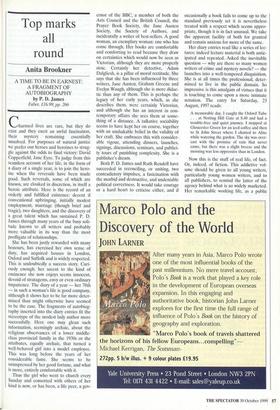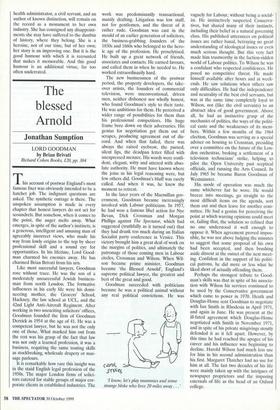Top marks all round
Anita Brookner
A TIME TO BE IN EARNEST: A FRAGMENT OF AUTOBIOGRAPHY by P. D. James Faber, £16.99, pp. 266 Charmed lives are rare, but they do exist and they exert an awful fascination, their mystery remaining essentially unsolved. For purposes of natural justice we prefer our heroes and heroines to strug- gle against the odds to final victory: David Copperfield, Jane Eyre. To judge from this seamless account of her life, in the form of a diary of a single year, is to join the hero- ine when the reversals have been made good. Such reversals, some of which are known, are cloaked in discretion, in itself a heroic attribute. Here is the record of an orderly and fulfilled existence: decent if conventional upbringing, initially modest employment, marriage (though brief and tragic), two daughters, and the discovery of a great talent which has sustained P. D. James through many years of the busy soli- tude known to all writers and probably more valuable in its way than the most profligate of relationships.
She has been justly rewarded with many honours, has exercised her own sense of duty, has acquired houses in London, Oxford and Suffolk and is widely respected. This is undoubtedly a success story. Curi- ously enough, her ascent to the kind of eminence she now enjoys seems innocent, devoid of stratagems, envy or even ordinary impatience. The diary of a year — her 78th — in such a woman's life is good company, although it shows her to be far more deter- mined than might otherwise have seemed to be the case. The fragments of autobiog- raphy inserted into the diary entries fit the stereotype of the modest lady author more successfully. Here one may glean such information, seemingly archaic, about the religious observances of a lower middle- class provincial family in the 1930s or the attributes, equally archaic, that turned a well-behaved girl into a model employee. This was long before the years of her considerable fame. She seems to be unimpressed by her good fortune, and what is more, entirely comfortable with it.
Thus the girl who went to church every Sunday and consorted with others of her kind is now, or has been, a life peer, a gov-
ernor of the BBC, a member of both the Arts Council and the British Council, the Prayer Book Society, the Jane Austen Society, the Society of Authors, and incidentally a writer of best-sellers. A good woman, an exemplary woman: one who has come through. Her books are comfortable and comforting to read because they draw on certainties which would now be seen as Victorian, although they are more properly stoic. Certainly her detective, Adam Dalgliesh, is a pillar of moral rectitude. She says that she has been influenced by three writers, Jane Austen, Graham Greene and Evelyn Waugh, although she is more didac- tic than any of them. This is perhaps the legacy of her early years, which, as she describes them, were certainly Victorian, and although she has an interest in con- temporary affairs she sees them at some- thing of a distance. A talkative sociability seems to have kept her on course, together with an unshakable belief in the validity of her craft. She embraces this with consider- able vigour, attending dinners, launches, signings, discussions, seminars, and publici- ty tours of punishing complexity. She is a publisher's dream.
Both P. D. James and Ruth Rendell have succeeded in reconciling, or uniting, two contradictory impulses, a fasicination with the morbid and destructive, and undeniable political correctness. It would take courage or a hard heart to criticise either, and if occasionally a book fails to come up to the standard previously set it is nevertheless treated with a respect which seems appro- priate, though it is in fact unusual. We take the apparent facility of both for granted and remain anxious for more of the same.
Her diary entries read like a series of lec- tures; indeed lecture material is both antic- ipated and repeated. Asked the inevitable question — why are there so many women writers of crime and mystery novels? — she launches into a well-tempered disquisition. She is at all times the professional, deter- mined to live in the public domain. So impressive is this amalgam of virtues that it is touching to come upon a more intimate notation. The entry for Saturday, 23 August, 1997 reads:
A memorable day. I caught the Oxford Tube . . . at Notting Hill Gate at 8.40 and had a trouble-free and quiet journey. I stopped at Gloucester Green for an iced coffee and then to St John Street where 1 chatted to Alixe while watering the garden. The sky was over- cast with the promise of rain that never came, but there was a slight breeze and the morning was less oppressive than in London.
Now this is the stuff of real life, of fact. Or, indeed, of fiction. This addictive vol- ume should be given to all young writers, particularly young women writers, and to all publishers, to remind the latter of the agency behind what is so widely marketed. Her remarkable working life, as a public health administrator, a civil servant, and an author of known distinction, will remain on the record as a monument to her own industry. She has consigned any disappoint- ments she may have suffered to the dustbin of history, where they belong. She is a heroine, not of our time, but of her own; her story is an improving one. But it is the good humour with which it is recounted that makes it memorable. And this good humour is an additional virtue, far too often underrated.



























































































 Previous page
Previous page